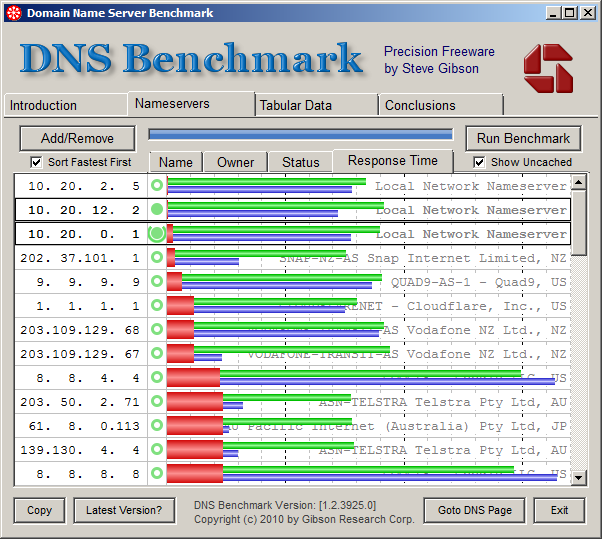I thought I'd try Cloudflares 1.1.1.1 for my home DNS as they claim it would "speed up your internet".
You can see the two days of 1.1.1.1 on the SamKnows report. I'll stick with 2Degrees:
|
|
In 99% of cases there will never be any performance gains using non RSP DNS servers over your RSPs own DNS servers.
There are various reasons why people may want to use 3rd party DNS servers - but improving DNS lookup performance is not one of them.
Please support Geekzone by subscribing, or using one of our referral links: Samsung | AliExpress | Wise | Sharesies | Hatch | GoodSync | Backblaze backup
I use Cloudflare DNS over HTTPS (DOH) with a DNS server running on a Raspberry Pi. I know this isn't the fastest, but offers privacy. General DNS queries are blocked by an outbound firewall. Much like yours, I see spikes in DNS:
I don't think anyone would notice a difference - betwen 2degrees, quad9 and Cloudflare the query response time is very similar.
Michael Murphy | https://murfy.nz
Referral Links: Quic Broadband (use R122101E7CV7Q for free setup)
Are you happy with what you get from Geekzone? Please consider supporting us by subscribing.
Opinions are my own and not the views of my employer.
1.1.1.1: 27 ms
9.9.9.9: 17 ms
202.37.101.1: 13 ms
Hardly worth worrying about.
If speed is important to you, move DNS resolution (with caching) as close as possible. I use unbound locally and bypass the ISP resolver. If some form of privacy is of higher concern then one of the anonymousing resolvers may be suitable (cloudflare et. al.). Running local DNS resolvers allows QNAME minimisation (RFC7816) to be used which can help improve privacy. I use DNSBench to measure the performace.

You've pretty much just described probably 95% + of users out there.
Pretty much every router these days runs DNSmasq (or something similar) so unless people intentionally change their DHCP settings to hand out a RSP or 3rd party DNS then they're going to be running their own DNS cache locally.
Yes, 95%+ will be used a single appliance with DNSMasq or similar, which will discover the upstream resolver via ppp/dhcp. The 99% of the masses won't be reading geekzone and certainly won't be thinking about DNS forwarding and/or resolution.
Depending on your equipment/setup it is possible to move from DNS forwarding (e.g. DNSMasq) to local DNS resolution. This may provider better results, but my key point is to use something (like DNSBench) to measure the results.
|
|
